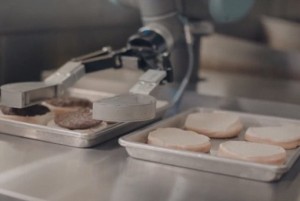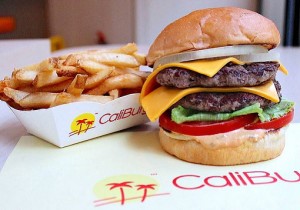Competing For Jobs – Flippy Mastered Art Of Flipping Burger On Day One
Flippy was thrilled to be offered a job at Caliburger, a restaurant in California. Unlike other workers, Flippy hasn’t made a single complaint despite being forced to flip burgers the whole day. And Flippy has just completed its first day on the job, having mastered the art of cooking the perfect burger, something that normal workers won’t be able to achieve.
Meet Flippy, a burger flipping robot which took only 5 minutes to install. The robotic kitchen assistant, a brainchild of Miso Robotics, uses cameras and sensors to determine when the burger is fully cooked, before places them on a bun. A human worker would then takes over and adds condiments. Soon, human will lose the job of flipping burgers – forever.
“Much like self-driving vehicles, our system continuously learns from its experiences to improve over time,” said David Zito, co-founder and chief executive officer of Miso Robotics. While workers are too happy to complain about losing the tiring and dirty job of flipping burgers, they might not realize that it isn’t flipping burger job that they’re slowly but surely losing.
Mr. Zito continued – “Though we are starting with the relatively ‘simple’ task of cooking burgers, our proprietary AI software allows our kitchen assistants to be adaptable and therefore can be trained to help with almost any dull, dirty or dangerous task in a commercial kitchen – whether it’s frying chicken, cutting vegetables or final plating.”
Human workers at Caliburger might still feel superior to Flippy for the time being because the robot can only flip burgers. But soon the workers’ job of adding cheese, sauces or condiments could be taken over by the robot. Even for the simple job of flipping burgers, Caliburger aims to have Flippy robots installed in 50 of their restaurants worldwide by 2019.
CaliBurger claims the benefits of “employing more Flippies” include making “food faster, safer and with fewer errors”. Flippy is a cart-like contraption that comes with a six-axis robotic arm and a “sensor bar.” Simply set up Flippy next to a standard grill or fryer, and it will detect necessary data from a thermal sensor, 3D sensors, and various cameras to help it detect its surroundings.
Using a system that sends a ticket from the cashier straight to the kitchen, Flippy can actually take your food orders directly. It’s capable of unwrapping burger patties, placing them on the grill, keeping tabs on the meat’s cook time and temperature, and letting its “human colleagues” know when they are ready to be taken off the heat.
Because robot such as Flippy has built-in AI (artificial intelligence), they’re not some dumb robots that have been programmed to work specifically at certain factory. Flippy is continuously learning and absorbing new recipes. Eventually, robots would be able to do most, if not all, of jobs in the kitchen of a fast-chain restaurant like CaliBurger, Wendy’s or McDonald’s.
Does that mean human workers will be jobless? Not necessarily, according to Mr. Zito. There will always be jobs for human such as food tasting, quality assurance, customer service or some other jobs yet to be discovered or created. Like it or not, robots are here not only to take over human jobs in flipping burger but also in order taking.
Fast-food restaurant chain Wendy’s announced last month that they will install self-order kiosks at 1,000 stores across United States by the end of 2017 to trim extra labour costs imposed by minimum wage hikes. Costing about US$15,000 each, Wendy’s said the implementation of kiosks would reduce labour costs and appeal to younger customers.
Wendy’s were struggling with California’s US$10 minimum wage while their franchise-owned restaurants in New York could not offset the higher minimum wage in the state, where the minimum wage is US$15. Based on Wendy’s projection, the kiosks would likely pay for themselves in less than 2 years.
Besides cutting down on the potential for human error, the kiosks could also help improve order accuracy. However, customers will still be able to order at the counter, for now. Still, such kiosks may find themselves out of job faster than human workers if ordering and payment move to smartphones.
The debate of machines taking over jobs from humans have been ongoing and created controversial. The issue was controversial that the French presidential candidate from the Socialist Party has suggested a tax on machines or robots that put humans out of work. Surprisingly, Microsoft founder Bill Gates supports taxing robots at work.
Other Articles That May Interest You …
- Food Scandal! – Subway’s Chicken Sandwich Contains Only 50% Chicken
- Starbucks’ Pledge To Hire 10,000 Refugees Backfires – Brand Crashes 70%
- Birthday Cake Fiasco – Here’s Why Boycott McDonald’s Is The Correct Thing To Do
- Fake Eggs Is Not Urban Legend – Here’s How To Make Them
- Bacon, Hot Dog, Ham, Sausages Makers Rubbish Cancer Report
- Move Over Musang King, We’re Here For The Tasty Six Pack Durian
- Great News!! – Eating 2 Chocolate Bars “A Day” Keeps The Heart Attack Away
- KFC Chickens With Six Wings & Eight Legs, Anyone?
- Reason Why People Get Cancer Found – It’s Purely Bad Luck3
✍ Sumber : ☕ FinanceTwitter
Mukah Pages memuat-naik beraneka jenis artikel menarik setiap jam tanpa henti dari pelbagai sumber. 📲 📖 Enjoy dan jangan lupa untuk 👍 Like & 💕 Share!
























Post a Comment